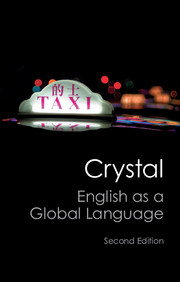Preface to the second edition
Published online by Cambridge University Press: 05 February 2014
Summary
Although English as a global language did not appear until 1997, it was actually written in 1995, which in 2002 seems a very long time ago, as far as global linguistic developments are concerned. The 1990s were a revolutionary decade, in that respect, with a proliferation of new linguistic varieties arising out of the worldwide implementation of the Internet, an emerging awareness of the crisis affecting the world's endangered languages, and an increasingly public recognition of the global position of English. Academic publications relating to this last topic seriously increased in number and weight. The largely article-driven literature of previous decades had typically been exploratory and programmatic, restricted to individual situations, anecdotal in illustration, lacking a sociolinguistic frame of reference, and focusing on the written (and usually literary) language. By contrast, the 1990s saw the emergence of a more comprehensive perspective in which spoken varieties became prominent, there was a real increase in the amount of descriptive data, and attempts were made to arrive at explanations and to make predictions of an appropriately general and sociolinguistically informed character.
In particular, several book-length treatments of English appeared, each providing a personal synthesis of previous observations and speculations, and focusing on the phenomenon of global English as an end in itself. By the end of the decade, the different attitudes had highlit a number of important theoretical issues, and made it possible to see the various kinds of focus adopted by individual authors.
- Type
- Chapter
- Information
- English as a Global Language , pp. ix - xiPublisher: Cambridge University PressPrint publication year: 2012

